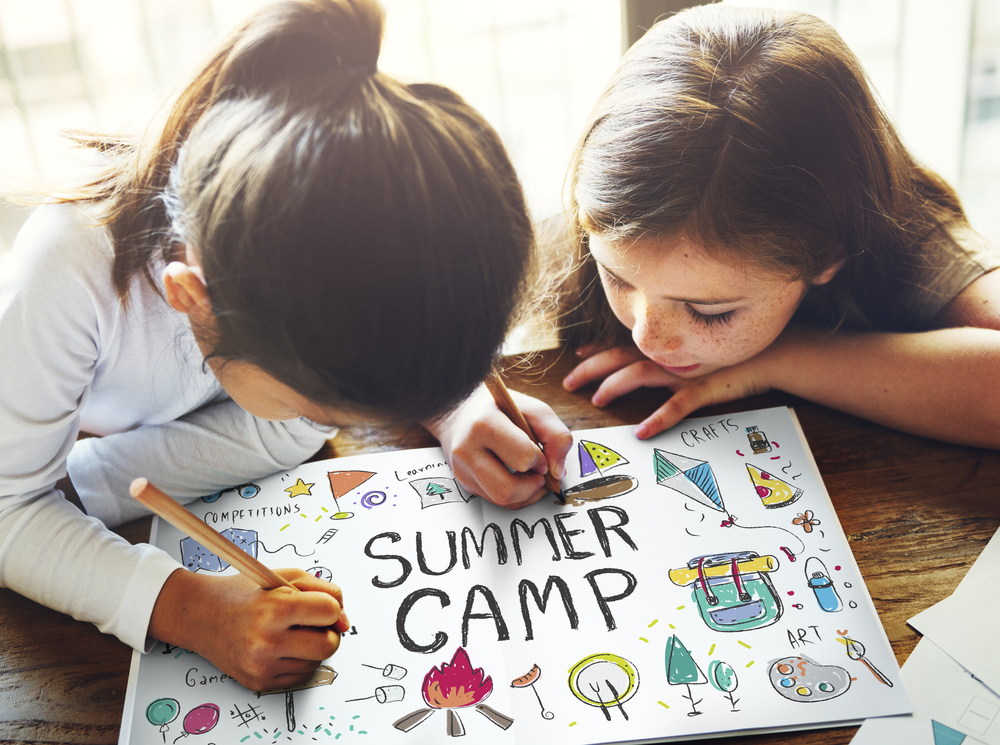8 Summer Learning Ideas For Young English Learners
The school bell may have stopped ringing, but summer is still a great time for all kinds of exciting learning opportunities. If you are wondering how you can help your little ones during their summer break to learn and practise English without the structured educational activities, then turn off your TV, ditch iPads and smartphones, and add these clever ideas, that combine fun and learning, to your cool arsenal!
1- The Daily Journal Project
When you were a child or teenager, did you keep a diary hidden in a drawer or under your mattress? Didn’t it feel great to be able to write about everything? Well, you may have stopped using a diary once you reached adulthood, but you can always engage young learners in writing a daily journal in English about their experiences, thoughts, and feelings! It’s a great way to help them improve their writing skills, and to lower their stress and anxiety levels.
2- The English-speaking World Summer Camp
Let your little ones choose an English-speaking country and focus on crafts, games, art projects, songs and recipes or snacks that are associated with it.
3- The Summer Scrapbook Project
Photos, postcards and tickets; these can all be used to create a great summer scrapbook. Have your young students record their summer experiences, help them keep their reading and writing skills sharp, and get ready for a lot of messy fun!
*extra tip: You can also help your little ones make an English collage with anything they like!
4- The Summery Home Cinema
It may seem obvious, but sometimes students have to be reminded of the importance of watching films in English. So provide your little ones with an entertaining and enjoyable way to get used to an English-speaking environment. Just let them choose a good film or even better, a film they love, bring in some popcorn, and allow them to have a whale of a time!
*extra tip: Subtitles in English can always be helpful.
5- The Reading Challenge
There are some great books and fantasy novels that can keep young children and teenagers entertained all summer long. For example, the Harry Potter series by J.K. Rowling and The Lion, the Witch and the Wardrobe by C. S. Lewis are some of our students’ favourite ones!
*extra tip: Create a reading nook at home and keep it vibrant with lots of vivid colours and patterns. Having an intimate space with defined borders is an idea all kids love! You can also suggest audio books as an alternative to print, especially if your children have to deal with any learning disabilities that make reading a struggle for them.
6- The Music Factor
Summer, sunshine, and songs really seem to go hand in hand! Memorable lyrics and rhythmic language motivate all young students. So, why not indirectly expose your little ones to authentic and easily accessible examples of spoken English? Even as background sounds, listening to songs in English can really help not only young children, but also teenagers.
*extra tip: Songs and 3D cartoons are ideal even for preschool children and very young students. That’s why we have accompanied our Voices books for the Pre-junior and Junior levels with exciting extra music videos. And you can find some of them online and free for all!
7- The Board Games Magic
Get the English version of Taboo, Scrabble, Pictionary, or any other board game that your children love, and let the fun begin! Educational board games are also exciting, especially for preschool children.
*extra tip: Apart from board games, you can also create your own games! For example, why not have a ‘Word Jar’, which is a jar filled with pieces of paper that have different words on each? Another idea is to draw a word every day with your child and then challenge each other to use that word in your English conversations throughout the day.
8- The Online Learning Era
Since there are innumerable free online resources for just about every type of learner, take advantage of the digital age and help your little students to brush up on their vocabulary. Even popular online games can help; but if they are not exactly what you're looking for, a simple search for educational apps will certainly provide more options.
*extra tip: There are also many interactive educational websites that you and your children can explore together.
National Geographic Kids and NASA Kids Club are two great examples.
Summer learning loss is a real phenomenon for students, and it’s even more prevalent with students who are learning English as a second language. But with a little help, your little students can turn the summer months into a fun and unforgettable learning experience. Your children don’t have to always sit at desks in front of white boards to be successful language learners!
If you found these ideas helpful, give this post a quick share on your favourite social media site. And feel free to leave your ideas and recommendations in the comments section!




Leave a Reply
Your email address will not be published. Required fields are marked